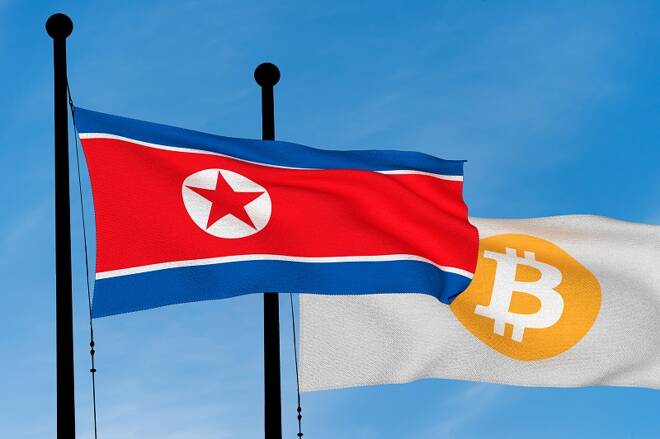Advertisement
Advertisement
How Bitcoin Helps Bankroll North Korea’s Arms Program
Updated: Mar 4, 2019, 13:21 GMT+00:00
Intro
The North Korean science that mostly alarms the world is the one that could one day produce a mushroom cloud. But increasingly, the technology that is keeping that threat alive is Bitcoin.
The isolated country has long been cut off from the global trade and financial system by a series of sanctions, imposed as punishment for continuing its ballistic missile and nuclear weapons programs in the face of international condemnation. But as it comes to trading in cryptocurrency—largely unregulated, anonymous and easily laundered—the reclusive regime of Kim Jong-un has found a way to maintain access to hard currency and keep funding its arms development.
The North Korean government could have made more than $200 million in trading the cryptocurrency, according to Priscilla Moriuchi, a former officer with the United States’ National Security Agency who now works for the cyber threat intelligence firm Recorded Future.
In a March interview with Radio Free Asia, Moriuchi said North Korea had managed to round up 11,000 Bitcoins, worth about $210 million at their peak last December (although just $72 million today). While that’s not nearly enough to bankroll a weapons effort as extensive as North Korea’s, it nonetheless demonstrates the creative lengths the regime will go to in order to maintain what it sees as its strategic insurance policy.
“I would bet that these coins are being turned into something—currency or physical goods—that are supporting North Korea’s nuclear and ballistic missile program,” Moriuchi said in an interview with Vox.
North Korea is believed to be active in running vast computer networks dedicated to generating the currency by solving complex mathematical problems. Such efforts are electricity-intensive, but this is surprisingly well-suited to North Korea, which has abundant supplies of coal but is famously dark in nighttime satellite images because consumer power generation is not a government priority. The regime needs ways to effectively export its energy that aren’t subject to sanctions, as coal shipments would be. And the high bandwidth usage involved is hardly an issue in a country where only a handful of elites are even allowed access to the internet.
But mining isn’t the country’s only way of gaining access to Bitcoin. There’s also simple theft. Already accused in the more traditional hacking of $81 million from the Bank of Bangladesh in 2015, North Korea is now thought to be bringing that experience to bear in raiding cryptocurrency accounts. Its hackers are suspected of stealing nearly 4,000 Bitcoins from the South Korean cryptocurrency exchange YouBit in April 2017, causing it to collapse. And South Korea’s National Intelligence Service believes North Korean hackers may have also been behind the theft in January of $530 million from Coincheck, a Japanese crypto exchange, the largest such raid to date.
The benefits of such efforts to North Korea are obvious, especially as it pursues, for now, a course of rapprochement with its longtime adversary, the United States. Any influx of cash that eases the pressure on the regime only serves to enhance its leverage in any negotiations. And if that cash can be obtained without clearly violating sanctions, there will be fewer calls on the American president, Donald Trump, to renew or expand penalties on Kim and his regime, freeing him to make greater concessions that benefit Pyongyang.
The Kim government is supported by the elites, whose loyalty is assured through the luxuries and perks that Bitcoin trading facilitates—everything from cognac to ski lifts—even as the rest of the North Korean economy strains and teeters from the weight of sanctions. But that government also enjoys the backing of an army of true believers, including the hacker corps that underpins all of these efforts.
“As a completely socialist country, money is not the primary motivator—duty to country is,” said Federico Tenga, a co-founder of the Bitcoin company Chainside who was invited to teach students at the Pyongyang University of Science and Technology and was surprised by their eagerness to learn about trading in cryptocurrency.
“There’s this feeling that a North Korean’s only motivation is to work for their country,” Tengo said in an interview with ExpressVPN, which advocates online privacy and security. “By using Bitcoin, you can help regain some agency over your country’s finances, i.e., handle Bitcoin for the state.”
Suggested Articles
- Bitcoin to be Worth $100 Million Per Coin by 2030?
- 10 Places Where You Can Use Bitcoin, Online, and Offline
- How Can Bitcoin Be Used as a Crime Weapon? And How Can this be Solved?
It isn’t clear what exactly can be done about all this. The measures that experts like Moriuchi believe are necessary to start crimping North Korea’s efforts—increasing regulation of exchanges and wallet providers, and creating reporting requirements similar to those that govern traditional banking transactions—seem unlikely to be embraced by the cryptocurrency enthusiasts who have built the trade on directly opposing principles: independence, anonymity, decentralization and privacy.
In this environment, it would seem, Kim has even less incentive to step away from his Bitcoin than he does to relinquish his nuclear deterrent.
About the Author
Advertisement
